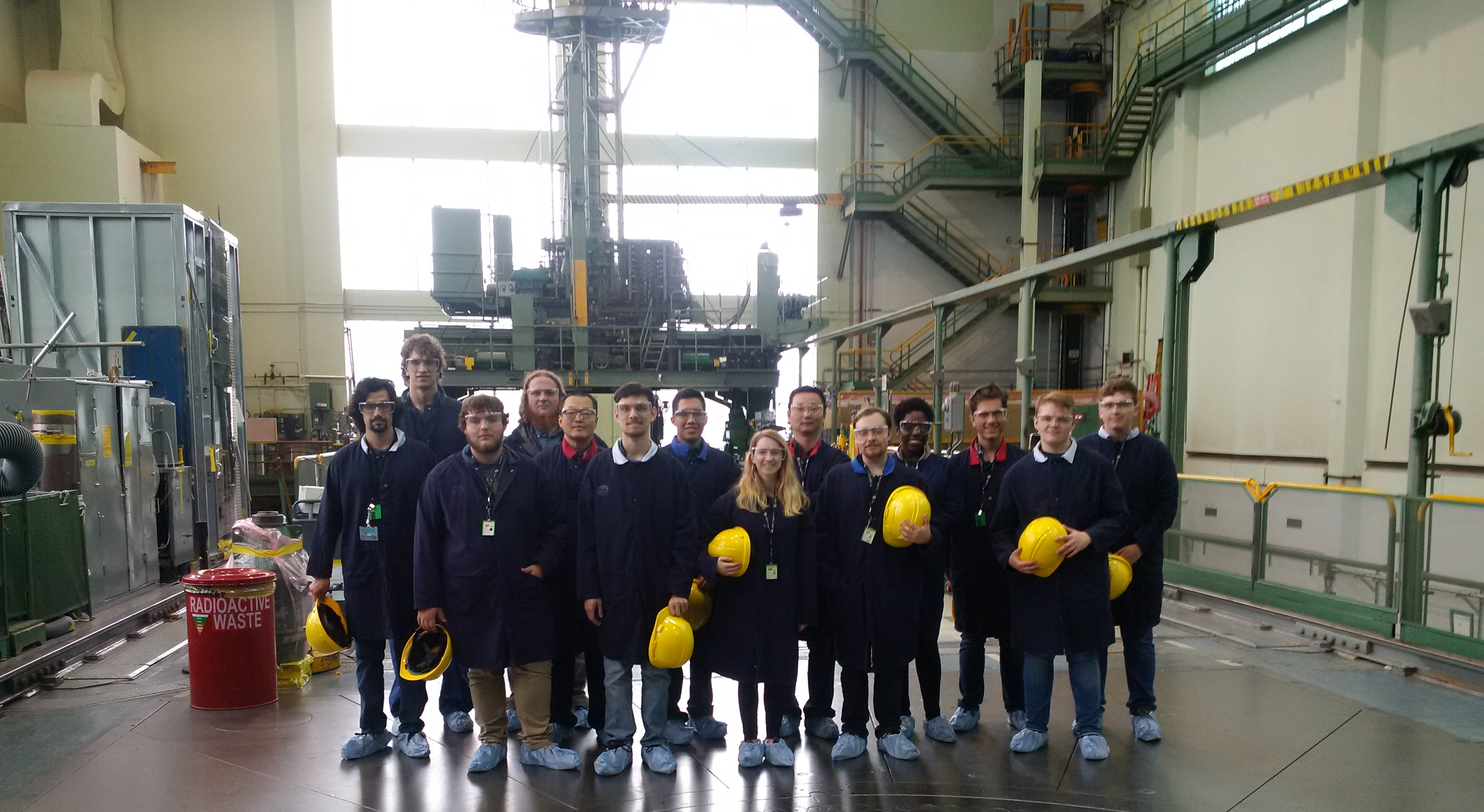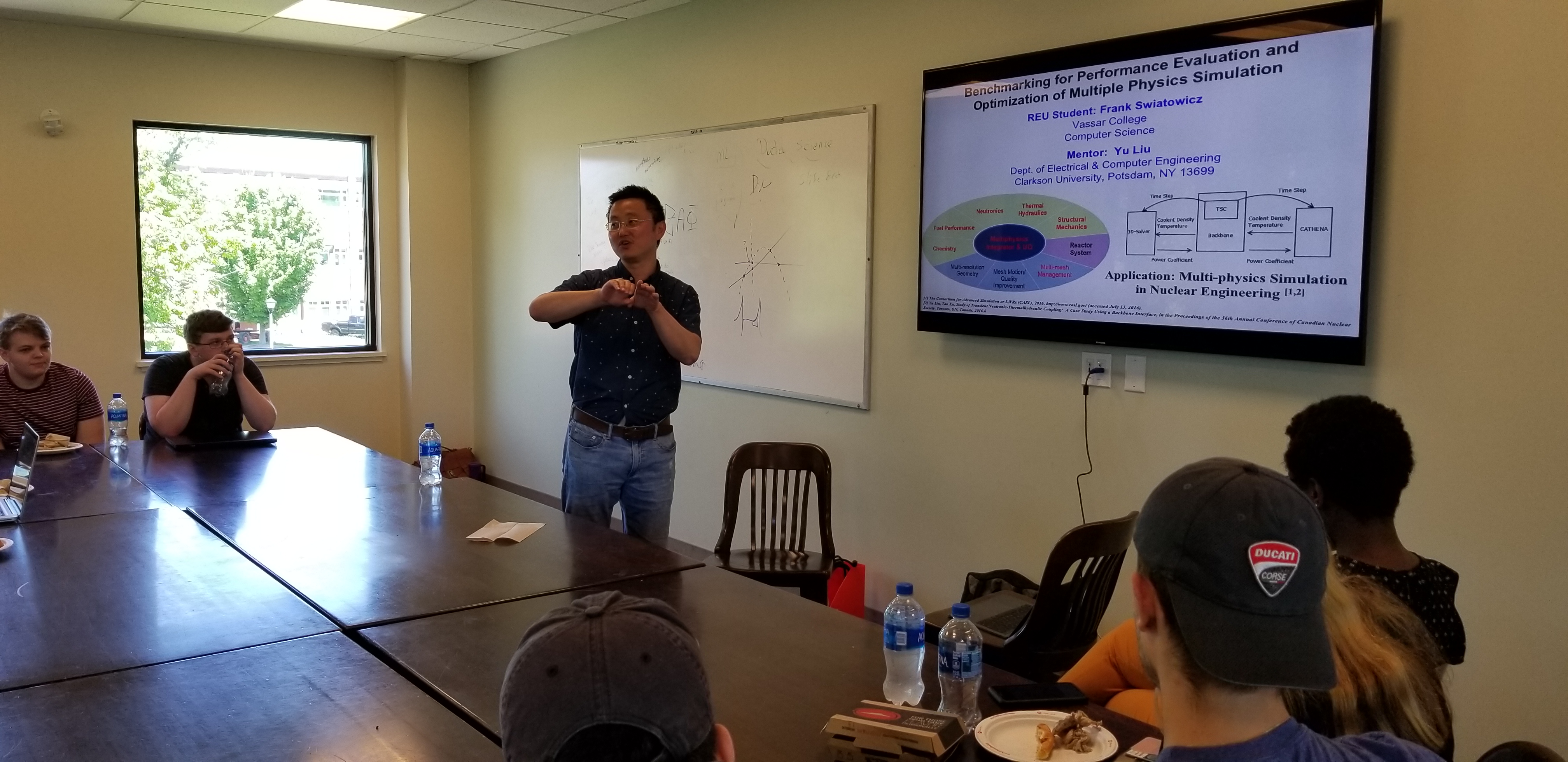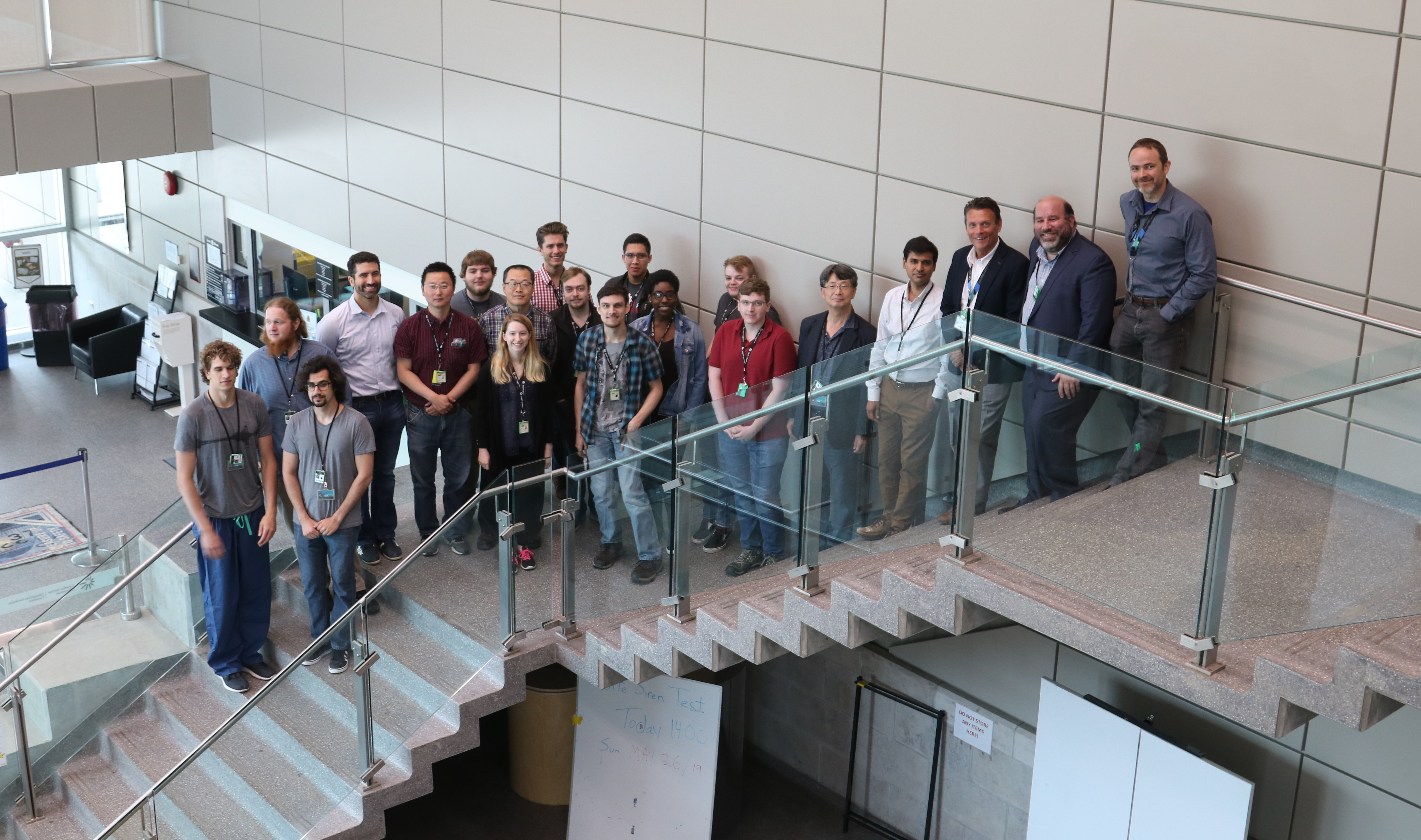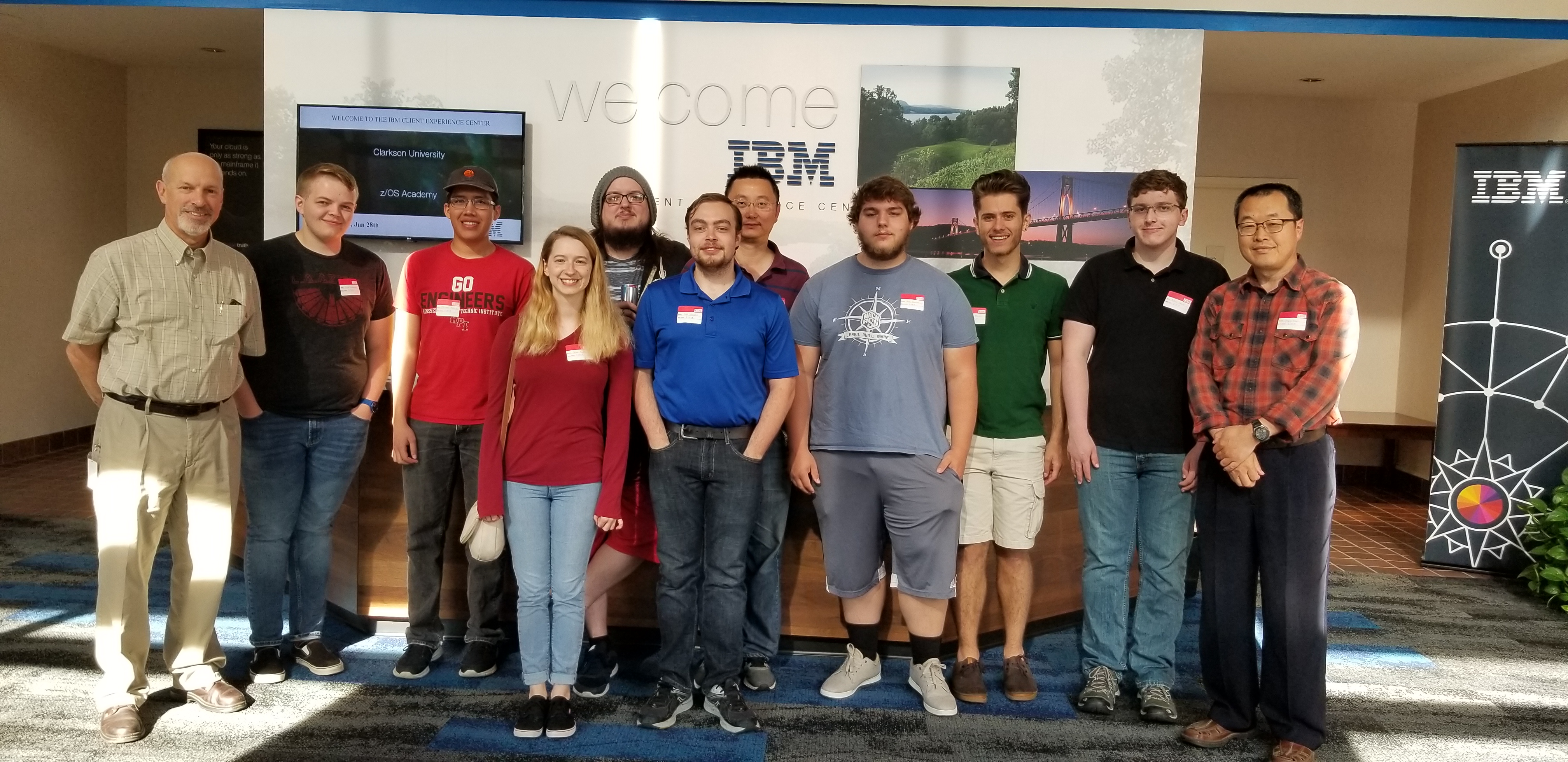

About this REU Site

This 3-year Research Experience for Undergraduate (REU) site will be focused on High Performance Computing (HPC), a field critical to national security, scientific discovery, and technological innovation. The goal of this project is to encourage 30 talented undergraduate students to pursue graduate study and careers in HPC by engaging them in exciting, ongoing research projects and by cultivating their talents during ten-week summer research experiences and beyond. Sixteen ongoing research projects available for students are innovative and share the common theme of societally relevant engineering applications that originate from disciplines as diverse as aeronautical engineering, chemical engineering, civil engineering, electrical and computer engineering, software engineering, and applied mathematics. The project thus serves the national interest, as stated by NSF's mission: to promote the progress of science; to advance the national health, prosperity and welfare; or to secure the national defense.
Students are recruited from institutions that offer limited or no research opportunities in HPC, such as historically minority colleges and universities. Faculties with expertise in HPC applications mentor the students to be researchers and provide them with specialized training in the design and development of HPC applications that are rooted in and motivated by engaging engineering innovations. This specialized training provides the students with technical and analytical skills in mathematical modeling, algorithmic development, and parallel and distributed programming, which benefit them in future pursuits such as graduate study or industry work. The quality of this training is further reinforced by additional professional development activities, including an HPC crash course, field trips, invited speakers, weekly group meetings, and a mentor training workshop for faculty. Seminars in career development, literature search, technical writing, and graduate school advisement, are also integrated into the program, and all student participants are given the opportunity to attend and present in professional conferences.
Program Objective
- Engage a total of 10 students annually from traditionally underrepresented groups or colleges and universities with limited research opportunities and immerse students in ongoing research projects in HPC-related engineering fields;
- Cultivate talented students to effectively plan, conduct, and communication scientific research through meaningful and engaging research projects, close and effective mentoring, weekly group meetings, mentor training, and public presentations;
- Improve educational pathways to advanced HPC-related careers through student involvement in field trips, invited speakers, and additional professional development activities.

Important Dates and Deadline
Application Deadline: Thursday, February 1, 2024Extended: Sunday, Feburary 18, 2024
Final Date for Selection or Declination: Sunday, February 18, 2024Rolling enrollment is in progress
REU Participants Arrive on Campus: Sunday, May 19, 2024
REU Program starts: Monday, May 20, 2024
RAPS Conference: Wednesday, July 24, 2024
Final Day of REU Program: Wednesday, July 24, 2024
Participant Activities
- Orientation & Team Building: Welcome the students and to familiarize them with the REU team and with each other. Various speakers, including Dean of School of Engineering and research mentors, will welcome the students. High ropes course at Camp Oswegatchie for team building (Tentative);
- HPC Crash Course: To cover all three major HPC programming paradigms with hands-on lab exercises carefully designed to help reinforce concepts and consolidate learning;
- Weekly Research Group Meetings: To provide an authentic environment to stimulate peer learning and exposure to the broader set of projects, to experience the research process in a structured context, and to hone skills in both poster and oral presentation;
- Research Projects: Majority of the projects will be guided by experienced research faculty. See the project list at Research Projects;
- Field Trips: Two technical field trips organized for the REU cohort, including IBM's Poughkeepsie, NY facility and Canadian Nuclear Laboratories (Tentative);
- Professional Development Activities: Seminars from invited speakers, professional development seminars, and workshops (e.g., Ph.D. pathways, graduate school application process, secrets of a great personal statement, Ph.D. dissertation research, managing your faculty mentor, poster development, and public speaking).


Research Projects & Mentors (Tentative)
| Mentor, Department | Projects |
|---|---|
 Dr. Brian Helenbrook, Mechanical and Aeronautical Engineering Dr. Brian Helenbrook, Mechanical and Aeronautical Engineering |
Develop a Unstructured Mesh hp-FEM Solver for GPU Solution of the Unsteady Heat Equation in 2D. See Project Description. |
 Dr. Mahesh Banavar, Electrical and Computer Engineering Dr. Mahesh Banavar, Electrical and Computer Engineering |
1. Optical Flow. See Project Description; 2. Localization with signals over non-homogeneous media (with Dr. Jeremie Fish). See Project Description. |
 Dr. Jeremie Fish, Electrical and Computer Engineering Dr. Jeremie Fish, Electrical and Computer Engineering |
1. Network dynamics with distributed computing. See Project Description; 2. Localization with signals over non-homogeneous media (with Dr. Mahesh Banavar). See Project Description. |
 Dr. Ming-Cheng Cheng, Electrical and Computer Engineering Dr. Ming-Cheng Cheng, Electrical and Computer Engineering |
1. A thermal simulation methodology for thermal aware architecture design exploration of semiconductor chips (with Dr. Yu Liu). See Project Description; 2. Simulation of Quantum Nanostructures based on a Physics-based Learning Method. See Project Description. |
 Dr. Daqing Hou, Electrical and Computer Engineering Dr. Daqing Hou, Electrical and Computer Engineering |
1. Deep Learning for Behavioral Biometrics. See Project Description; 2. Speed up of Keystroke free-text data analysis. See Project Description; 3.Power system optimization problems in a high-performance computing (HPC) environment (with Dr. Leo Jiang and Mr. John Meyer). See Project Description. |
 Dr. Faraz Hussain, Electrical and Computer Engineering Dr. Faraz Hussain, Electrical and Computer Engineering |
1. Verifying Go software. See Project Description; 2. Benchmarking concurrent algorithms across parallel computing platforms. |
 Dr. Yu Liu, Electrical and Computer Engineering Dr. Yu Liu, Electrical and Computer Engineering |
1. A thermal simulation methodology for thermal aware architecture design exploration of semiconductor chips (with Dr. Ming-Cheng Cheng). See Project Description; 2. Multi-physics HPC framework for engineering computing. See Project Description. |
 Dr. Chunlei Liang, Mechanical and Aeronautical Engineering Dr. Chunlei Liang, Mechanical and Aeronautical Engineering |
1. Parallel Solution of Two-dimensional Hall Magnetohydrodynamics on Unstructured Meshes. See Project Description; 2. Unsteady Reynolds-Averaged Navier-Stokes Solutions of Turbulent Flows around Canoe Paddles. See Project Description. |
 Dr. Jianhua Zhang, Electrical and Computer Engineering Dr. Jianhua Zhang, Electrical and Computer Engineering |
Resilient and Scalable DER Control Algorithms under Practical Communication Infrastructures. See Project Description. |
 Dr. Suguang Xiao, Civil and Environmental Engineering Dr. Suguang Xiao, Civil and Environmental Engineering |
Thermo-mechanical modeling of deep foundations in warming permafrost. See Project Description. |
 Dr. Leo Jiang, Electrical and Computer Engineering Dr. Leo Jiang, Electrical and Computer Engineering |
Power system optimization problems in a high-performance computing (HPC) environment (with Mr. John Meyer and Dr. Daqing Hou). See Project Description. |
 Mr. John Meyer, New York ISO Mr. John Meyer, New York ISO |
Power system optimization problems in a high-performance computing (HPC) environment (with Dr. Leo Jiang and Dr. Daqing Hou). See Project Description. |

Accommodations & Travel
Stipend:
Participants will receive a research work stipend ($7,000) and a food stipend ($100 per week) for this 10-week program.
Housing:
Housing will be provided by Clarkson's university housing, and there is no cost to the participants. Detailed plan and location are subject to the summer renovation and improvement of Clarkson University housing, and will be announced once it has been finalized.
Travel:
Travel plan should be approved by the site directors in order to reimburse as moving expense (up to $600).

Eligibility & Application
Women, underrepresented minorities, and students from institutions with limited research opportunities are especially encouraged to apply.REU participants are strongly encouraged to pursue publication of their summer research.
Eligibility:
- U.S. Citizen or Permanent Resident;
- Basic programming skills, like C/C++;
- Minimal GPA 3.0;
- Has completed sophomore or junior year of study in all engineering, computer science, math, or a closely related field. Exception can be made for strong candidates.
Application Document List:
- College Transcript(s) (official transcript is requested);
- Resume (2-page limit);
- One page personal statement to justify why you are a good match for the selected project(s);
- One letter of recommendation (Ask your recommender to email it to Dr. Yu Liu)
APPLY NOW!
Contact
Dr. Yu Liu
TEL: (315)268-6510
Email: yuliu@clarkson.edu
Dr. Daqing Hou
TEL: (315)268-7675
Email: dhou@clarkson.edu
